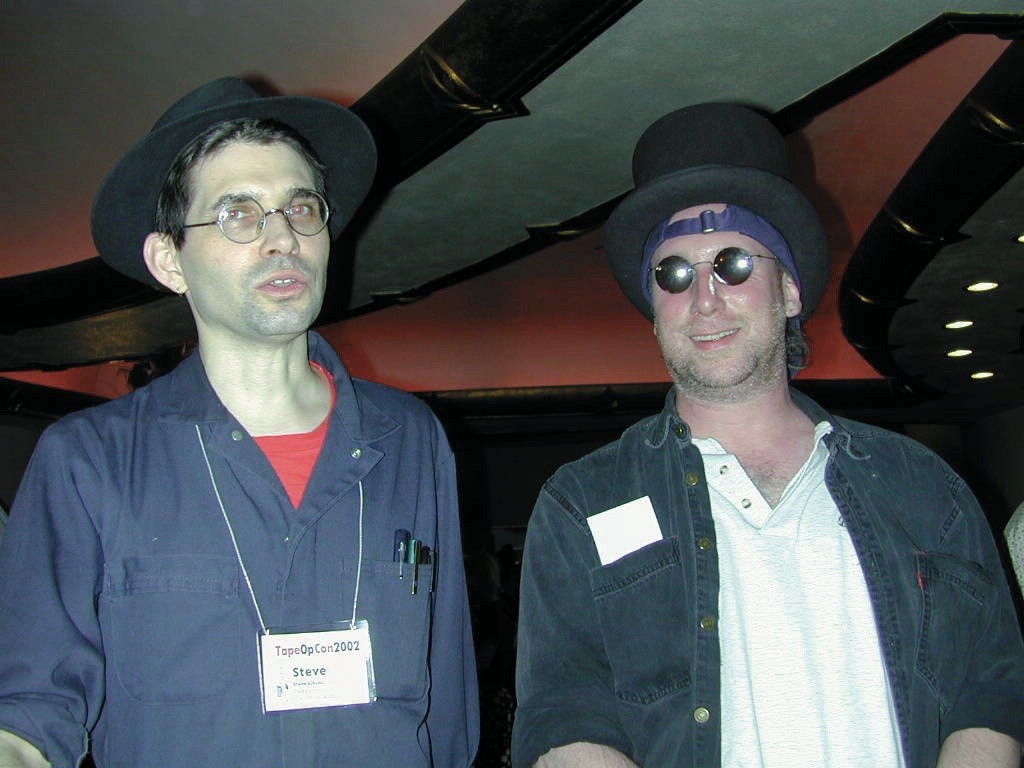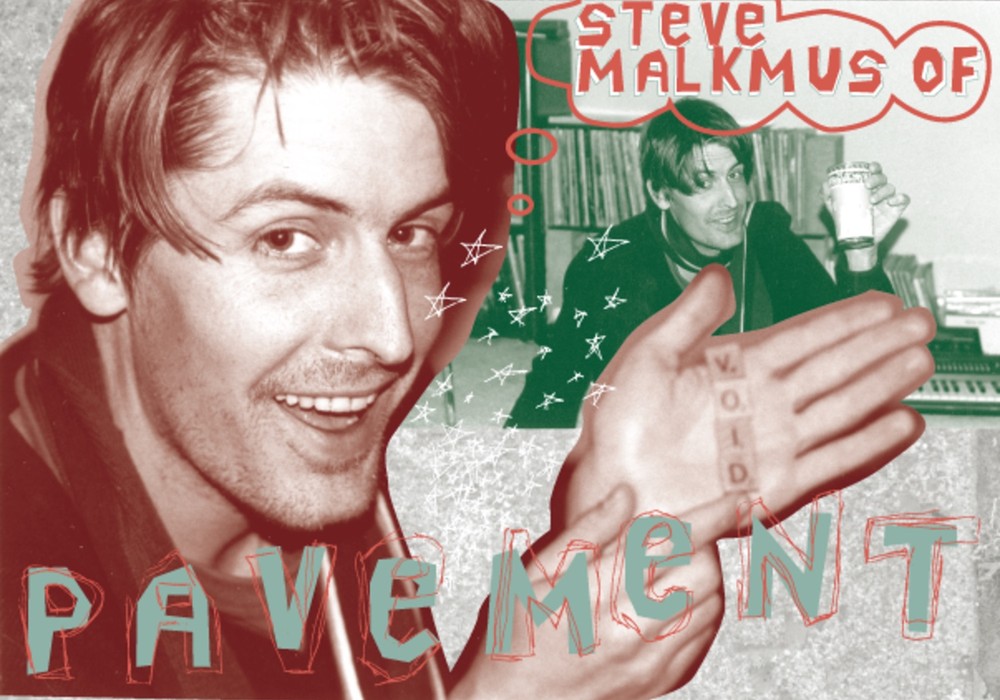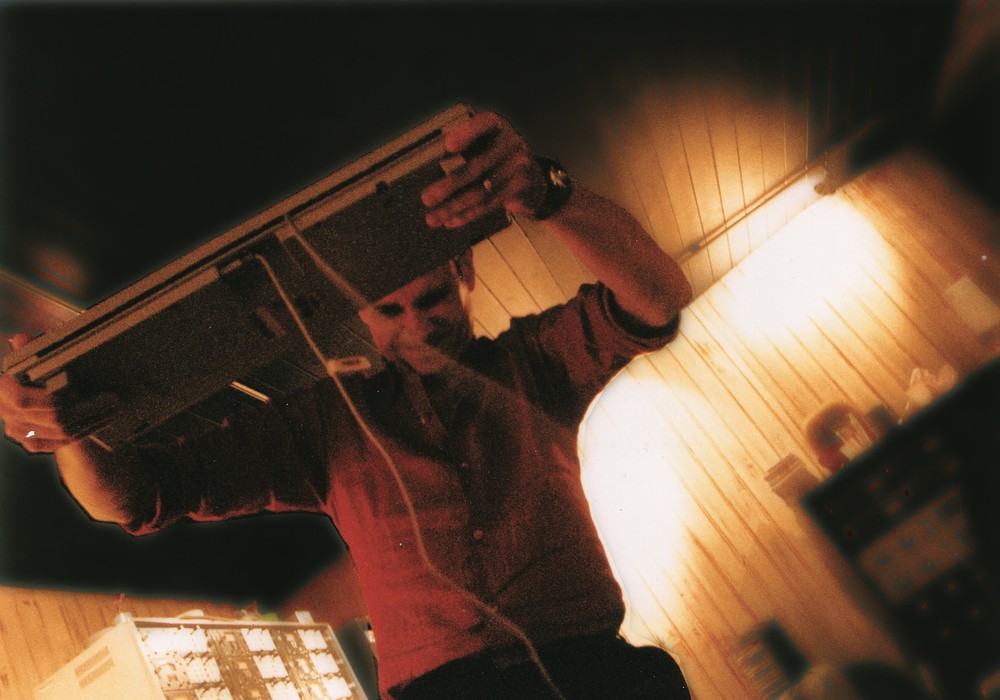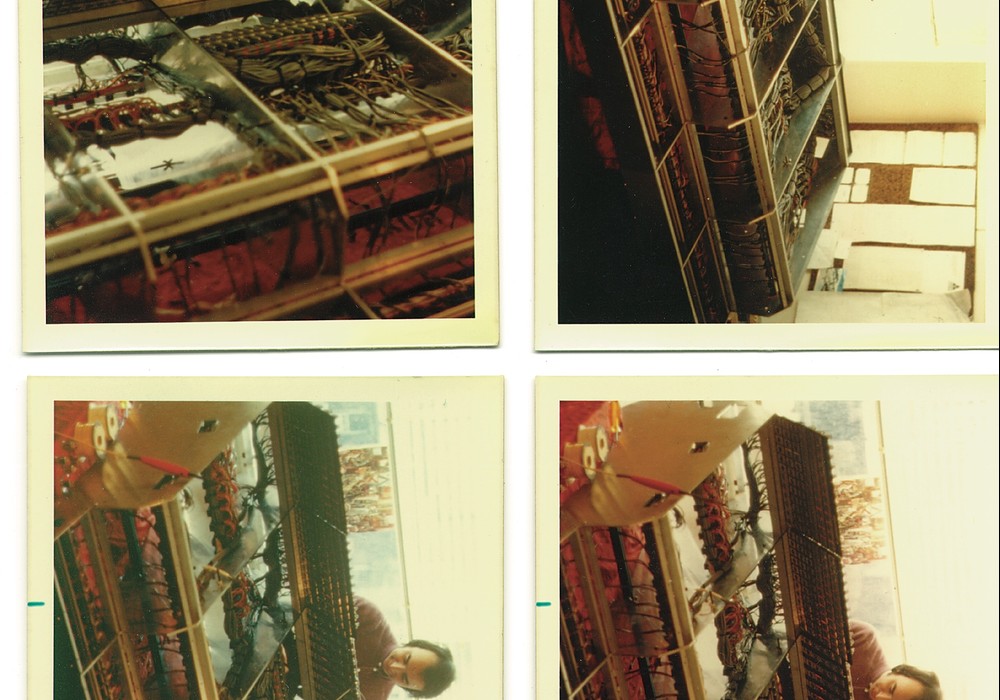In pro audio circles and throughout the vast realm of the internet, Fletcher is a ubiquitous and highly vocal presence. Always quick with commentary and an endless font of knowledge regarding even the most obscure pieces of gear, he is also the owner of MercenaryAudio, a purveyor of high-end boutique pro audio gear. In addition to selling his wares, Fletcher has also been involved in the design and tweaking of several pieces with various gear designers of note.
So how did you get started in gear pimping?
We used to get together and piss and moan about how the labels were screwing us around with our rates and with our rental gear and whatnot. So we decided that if we managed each other and then rented our own gear to each other, labels couldn't screw with us as much and say, "Oh you own that piece of equipment, that's just included in the session." It's like, "No I paid a lot of money for the fuckin' thing, and I'd like to recoup some of it. "So that's how Mercenary Audio started. We were booking each other, like, "Oh, no I'm sorry. Chris doesn't work for that rate, he works for this rate and he needs two points." So my buddy would negotiate for me and then I didn't have to get into a bad place with the band or with the record deals. It was kind of like management.
When was that?
That was around '85 and went on for a few years. Then it turned into this four-month period where I couldn't buy a gig. My wife was working and one Friday she was leaving the house in the morning and she says to me, "You know I don't get paid until next week. We've got fifty bucks to live on for the whole week Why don't you try and sell something before I get home?" At that time Mix magazine used to put out these directories of all the studios in a given region of the country. The May issue was studios in the Northeast. So I got on the phone and started calling around. Ed Evans down at the Power Station happened to need a pair of La3as, so I drove them down, got paid. But in the course of making all those phone calls there were other people that were like, "No, I don't need a pair of La3as but I am looking for this," or, "No, I don't need anything, but I'm trying to sell this." It turned into a kind of pro audio dating service and went along like that for a few years. Then we got this newfangled computer system, and it didn't work for shit. So, now instead of like taking listings and being able cross-index, we came to the conclusion that if we saw something we had to just buy it, or otherwise we'd never remember where the hell it was. If we found somebody who was looking for something we didn't have it in stock, chances are we were never going to find it to sell it to them. So we became more of a dealership than a brokerage.
About what year was that?
That was probably about '91.
Wow, just in time for the whole . . .
For the real vintage explosion, yeah. We kind of saw it coming and, frankly, we kind of made it happen. Engineers had always known about this gear, guys like Dan Alexander out of the Bay Area, Sye Mitchell down in L.A. had been doing this whole sort of vintage thing for eons. We just kind of put the name on it.
So in terms of your impact on the various "Mercenary editions" of gear that have been put out in the last few years, what the hell do you have to do with any of it?
Like the Avalon piece is just sort of me being a cheap bastard. There were two versions originally, one with a high head room input transformer and the nice aluminum knobs. There was this one with a cream- colored face plate and cheap plastic knobs. I could really hear the difference between the high head room input transformer and the non-high input transformer. [I] couldn't hear a damn bit of difference between the color of the knob caps. So I asked Wyn over at Avalon if he would make them for us with the good input transformer and the cheap-ass knobs. One thing led to another and it turned into the S37SM, which was actually the first of the Mercenary edition.
So what about the Drawmer 1969?
I was doing an album with this producer who swore that the original Drawmer 1960 shit ice cream, and I just swore that it was shit. You may have noticed I may not be bashful about mentioning when I think that something is a piece of shit on the internet.
Yeah, I noticed.
I got a call from the Drawmer people and they were like, "Would you mind shuttin' the fuck up?" And I said, "Na, that ain't gonna happen." And they said, "Well, can you do better?" I said, "I believe we could." So I got on the phone with a friend of mine who's a designer and I said, "Do you feel like doing this?" He said, "Yeah, okay, sounds good. I think I can negotiate a deal where you get a royalty on every unit that gets sold, we'll just put our name on the front and get things moving toward the Mercenary seal of approval. We went through about a half dozen prototypes to find what it was that I really wanted in a two-bus compressor and that's where the compressor in the 1969 came from. At first it was this whole debate about whether it should be called the 1960 Mercenary edition and then I realized as press about this started to leak out I started to get all these emails and phone calls and shit about "Will you be able to update my regular 1960 to a Mercenary edition?"
Oh, joy.
And I said, "Eh, this is gonna be a cluster fuck, so let's change the model number on it." So they didn't really want to do that and I said, "Well, then let's just forget the whole fucking thing. I'm not going through this 250,000 times a fucking week." So they finally said, "What do you want to call it?" I said, "I don't know, 69 is my favorite number, so why don't we call it the 1969?"
So it's not based on the 1960? Or is it?
The chassis, the direct box, the power transformer, and that's about it. We even drilled a few extra holes in the faceplate. But the compressor and the mic pres are all brand new build.
What about the Great River stuff?
The Great River stuff just evolved from me and Dan talking. He was looking to build another product to go along with the MD2MH and I think it was right about the same time the Vintech came out and the N word was everywhere, and we just got to talking about how I've found over time that if you do a lot of tracks with a Neve module you start to get this sort of Neve haze buildup kind of thing happening. It just seemed to me pragmatic to make something based on a Neve module that sill had the size and the opulence, but didn't have that buildup and potential haze.
Do you think the vintage gear thing has peaked in terms of what people are paying for old Neve modules and other "vintage" stuff?
I think so, yeah. When we got into selling this shit it was because there were a bunch of old engineers out there who knew what the old gear was and knew what it sounded like and then wanted the old gear because they were having a tough time getting anything that came close to the sound of that hardware with the new stuff. As time has marched on I have a wonderful collection of boutique manufacturers that have gone back and built quality equipment — not so much in the emulation vein, but creating quality equipment that is capable of really creating amazing audio that lets people make incredible-sounding records. It's not so much the vintage thing or the anomalies of the vintage thing — it's quality audio that is able to make an impact on or enhance the emotion of the musical performance, which is what people seem to want rather than, "Oh, shit, this sounds old."
So are you feeling pretty comfortable the way things are going as far as digital audio is going these days? You were telling me you were using Radar and Digital Performer.
Yeah, Radar more than the Performer these days. Performer came before Radar out of the necessity to use something cheap in my buddy's attic, 'cause we were doing demos. But with this Radar thing now, man. The last basic session I did I took a perfectly good Studer AA27 and unplugged it and moved it across the room so I could set up the Radar unit.
Wow.
Yeah it scared the shit outta' me too. I'm sittin' there mumbling to myself, "You know, if you fucking told me ten, five years ago that I'd be taking a perfectly good Studer and pushing it away I'd ask you where you bought your crack."
Where you doing it at 44 or 48 or were you doing 96 . . .?
44.1 with, my box has the S Nyquist filters in it, and I don't know if that makes a god damn bit of difference, but I was doing the regular 44.1 and just fucking loving it.
I've talked to a couple of engineers who are hot on the Radar.
You know, I had a couple of Empirical Labs EL7 Fatso Jr's, and actually I didn't have a Crane Song HEDD on the basic session, but I did a lot of the overdubs with a HEDD. But I used the stock converters, used some outboard mic pres like I used the Vipre on front of the kit mic and I used the Phoenix Audio DRS-2 for the overheads and used Great River MP2MV on the bass. But the rest of it was done all through the stock. We were working in this place called The Outpost, which has aTrident A Range console. I can hardly wait to mix this thing where I can get back on a real console, 'cause my buddy Tim only has this Mackie piece of shit. Trying to recreate something that even gets close to these rough mixes with that Mackie is...
Oh, man.
...like trying to suck a golf ball through a garden hose. I don't think it can be fucking done. But the magic of tracking with a Mackie as a monitor console is that you can't use EQ. The other really cool thing is, it makes me work hard as a son of a bitch to really get the sounds to work together and gel. Mic selection and placement just becomes so much more important because I don't have any other little crutch tools that I love to use, like an open sounding mix bus. So now this shit has to fight for survival in a mix bus that has all of the volume and lusciousness of a paper towel cardboard tube.
So you said you were working on the Trident A Range on this particular project.
Yeah, that's what we cut the basics on and then we moved it over to his house, 'cause we had about nine dollars worth of budget left over.
Are you mixing to tape these days, or are you mixing digitally?
That's yet to be seen, at least on this project. Last couple of projects I've been mixing to 1/4" at 15 ips, just cause it sounds like a fucking Kiss record and I love it. This one, the place we're mixing is Zach's down in Atlanta, and they ain't got a 1/4" deck. So what I think we're going to do is mix to 1/2" and then go through a Crane Song HEDD 192 and back it up to CD-R. And then if the 1/2" sounds better than the back-ups, Tim is going to have to bite the bullet and buy some fucking tape.
What do you think about the whole "tube" thing in pro audio during the last few years?
I mean, maybe I'm partly to blame for this whole tube revolution, although I keep going over it in my mind and I keep going, "No, I never said things were good 'cause they were warm," you know. The whole concept of warm tubes, they don't make shit warm. They make the room warm — they'll raise the air temperature. That's not a big fucking struggle, but audio? It's just as easy to design piss poor with little glowy mother fuckers as it is to design piss poor with, you know, IC chips.
One thing that I wanted to talk about is the forum that you host on Pro Sound web. This kind of forum, where what a lot of people would consider a black art — the recording arts and music production — is something that only the web could have made possible.
What's really neat is, you had a whole period where I worked for this artist that wanted to find out about all these old recording tricks, and I got sent all over the world to meet people and delve into this and learn this shit, then come back and spew what I learned. What do the kids have access to today? Well one, maybe two guys who've actually been around the block, that decided they wanted to settle down and have a little house. So they teach at the local recording school, but not that same wealth and breath of accumulated knowledge that I was wonderfully exposed to. With these forums, you can now talk with some really heavy guys about what they do and their techniques. Now there's just all of this information. I mean, people keep calling it — on rec.audio.pro and whatever — call it my three mic drum technique. It's like, "No. This thing was in existence long before they started shooting Kennedys, you know."
I always thought it was a Glyn Johns thing.
It might have been, but maybe he got it from somebody. Who the fuck knows? And then people started to think that it was competitive and started to hide their techniques from each other, and other people didn't give a shit because they were making so much fucking money they didn't know, they had no way of spending it anyway. So they would share, and assistants on the session would always learn. But there used to be house engineers and then house assistants. People didn't really cross-pollinate and get out that much. So you'd end up with more of a sound from a studio because 'a' engineer did this this way and 'b' engineer did this that way, and it was all part of a single house method. Then when all the studios stopped paying staff engineers and just had assistants, and engineers started to become migrant workers, a lot of these techniques started to cross- pollinate and things got a little bit more... the same. So, it wasn't like this house had this sound, the way it did when this shit was first getting going.






_disp_horizontal_bw.jpg)





_display_horizontal.jpg)